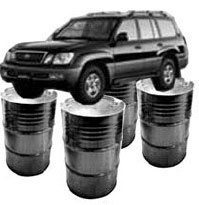The automobile market has remained robust despite continuous oil price hikes and talk about a new petroleum tax since early this year.
The media especially seems to indulge in the boom more than others - except the manufacturers of course.

The other day, two anchors of an auto news TV show could not contain their excitement when they announced the type of vehicles that were drawing the most attention from potential customers at a recent auto show in Guangzhou. They were none other than SUVs (sport utility vehicles) and MPVs (minivans).
Last year, the production and sale of SUVs enjoyed double digit increases year-on-year in China. The trend has continued this year.
An automobile page of a national media portal made use of the two facts that contradict each other, to illustrate six new brands of SUVs. The report said these "oil-guzzlers" are selling so well that some people do not even mind paying extra in order to be able to drive these new brands four or five months earlier.
To encourage people to buy SUVs, the media spares no effort in glamorizing the fact that owning an SUV is "a must for consumers who pursue a high quality of life".
However, I find this a little disconcerting.
SUVs are notorious for their heavy greenhouse gas emissions and fuel-inefficiency compared to regular cars. Recognizing the drawbacks of SUVs, European countries have discouraged their sales and use on roads.
Owners of SUVs who drive into the center of London now have to pay more fees to park. As London Mayor Ken Livingstone said last year when he proposed the new charge, he was trying "to affect the choices people make in terms of the cars they are buying".
While Spain and Switzerland have joined Britain in levying more fees, other cities in Europe, including Paris and Amsterdam, have also begun deliberations to restrict the number of SUVs on the roads.
Unfortunately, in our society's drive for a so-called "high-quality" of life, many of us, especially media people, overlook the drawbacks of SUVs and other cars that consume a lot more petroleum than regular family cars.
When the media promote SUVs, they seem to be oblivious to the fact that our country is already petroleum-deficient as well as plagued by increasing greenhouse gas emissions. It seems the fact that more than half of the air pollution in the national capital is caused from exhausts from cars does not matter, when they talk about SUVs.
They simply remain unmoved when government as well civil society leaders from all over the world have gathered in Bali to talk about ways to reduce the effects of global warming and deal with climate change.
The government too, has also been slow to formulate laws, regulations or new taxes to restrict the development and use of SUVs.

Only late last month did the organizational affairs management of the State Council issue a circular requiring the Party and government departments and agencies to take the lead to use environment-friendly, oil-efficient, domestically-manufactured vehicles. On principle, no government organization should use SUVs, except for special needs.
Above all, the circular asks all departments and agencies to cut the government vehicles' petroleum consumption by 20 percent.
The circular has all the right requests, but it will take time and determination to really enforce it and make it effective.
Meanwhile, the media should make louder calls to people that quality of life should not be achieved by aggravating the already polluted air and wasting more fossil fuels.
E-mail: lixing@chinadaily.com.cn
(China Daily 12/06/2007 page10)

